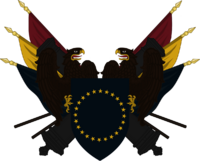National Assembly of Carloso
This article is incomplete because it is pending further input from participants, or it is a work-in-progress by one author. Please comment on this article's talk page to share your input, comments and questions. Note: To contribute to this article, you may need to seek help from the author(s) of this page. |
National Assembly of the Federal Republic of Carloso | |
|---|---|
| 44th National Assembly of Carloso | |
 | |
| Type | |
| Type | |
| Houses | National Assembly |
Term limits | None |
| Leadership | |
Jorge Moran since 11 February 2011 | |
Deputy Speaker | Tomás Ocanas, National Salvation since 23 January 2017 |
Government Chief Whip | Noel Sabater, National Salvation since 5 July 2021 |
Leader of the Opposition | Mariah Contreras, Socialist Republicans since 11 February 2021 |
Opposition Chief Whip | |
| Structure | |
| Seats | 859 430 (or 429 plus the Speaker) for a majority |
 | |
Political groups | Government (445)
|
Length of term | Five years |
| Elections | |
| Single transferable vote with elimination transfers only (STV-ETO) | |
Last election | 11 November 2020 |
Next election | 11 November 2025 |
| Redistricting | Confirmation by the President on the advice of the boundary commissions. |
| Meeting place | |
| Monrentera Palace, Madrigal, Carloso | |
 |
|---|
| This article is part of a series on the politics and government of the Federal Republic of Carloso |
Related topics
|
The National Assembly of Carloso (Spanish: Asamblea Nacional de Cárloso) is the unicameral legislature of Carloso. While its current form dates to the enactment of the 1956 Constitution of Carloso, the National Assembly was founded in 1860 as the Imperial Assembly of the Carlosian Empire.
The last general election in Carloso was held in 2020. The next will be held in 2025.
A member of the National Assembly is called a National Assemblyman (NA). The term National Assemblywoman can be used if the individual is female.
Etymology
History
Carlosian Empire
Imperial Assembly | |
|---|---|
| Type | |
| Type | |
| History | |
| Disbanded | 29 May 1932 |
| Succeeded by | National Assembly |
| Seats | 301 |
| Elections | |
| Single non-transferable vote (SNTV) | |
First election | 1860 |
Last election | 1930 |
The original 1826 Constitution invested legislative power soley in the Imperial Council, the predecessor to the modern Executive Council. This body was led by a President, who was directly appointed and served at the pleasure of the Emperor. Any legislation passed by the Imperial Council could be approved or vetoed for any reason by the Emperor, effectively making Carloso an absolute monarchy. As the years progressed, it became apparent that such an autocratic system of government would be difficult to maintain as the increasingly more educated public called for greater participation in political life. There was also the matter of reconciliation with the hundreds of thousands of English-speaking Carlosians who had a non-existent degree of representation within the exclusively Carlosian-speaking government, compounded by the fact that many of the former British institutions and civil service had been absorbed by the new Carlosian Empire. Fearing that the present situation may result in revolution if pre-emptive action wasn't taken, President Cristián Fegúndes, supported by former President Baltasár Escarcega, put forward a proposal to Cárlos I for the formation of a Westminster-inspired parliament in the form an Imperial Assembly, with 301 seats and an electorate composed of all male heads of households.
Initially refusing to yield, Cárlos I ultimately yielded upon the insistence of Escarcega, convinced that there was now a need to give his rule some semblance of democratic legitimacy. Coinciding with the creation of the Imperial Assembly, English was made a co-official language of Carloso. Under the so-called 1860 Compromise, elections would be held with constituencies returning three members each, with an extra seat reserved for future elections for the constituency from which the speaker would be elected from, to make up for the loss in representation. The single non-transferable vote (SNTV) system would be utilised. Members of the Imperial Council would be drawn from the Imperial Assembly, however the Emperor would ultimately have the powered to appoint the President of the Imperial Council, and would retain his veto on legislation. The first general election was scheduled for 11 November 1860, and the first at least partially democratically elected Imperial Assembly took their seats on 11 February 1861. Despite the death of Cárlos I earlier in the year, the 1865 election was held under similar circumstances.
His successor, Cárlos II, though in poor health, was more more open to reform, and agreed to new measures which enfrancised men over the age of 25, taking effect at the 1870 election. The liberally minded Empress Marianne approved legislation to give women over the age of 40 the right to vote in 1888. Sébastien I initially agreed to reduce the voting age for men to 21 and for women to 35 in 1915, however his sudden death, and the ascension of the more belligerent Sébastien II, delayed this until 1922.
Republic
Federal Republic
Elections
Constituencies
Single transferable vote
The system of the single transferable vote with elimination transfers only (STV-ETO) often penalises parties who field popular candidates in a constituency, as if their votes exceed the quota and they are elected, any surplus votes beyond that quota cannot be redistributed to other candidates running under that party. This resulted in the largely three-party system (Conservative, Democratic, Socialist Republican) that dominated Carlosian politics up until relatively recently. There is a fierce tradition in Carlosian politics of transfer pacts and complex political strategy in almost every constituency. If a party wishes to run two candidates in a constituency, posters and other election literature will direct voters to vote for a particular candidate depending on their geographic location. As such, the strength and discipline of the grassroots are vital to electoral success.
Carloso uses the Hare quota method.
Composition
| Party | Ideology | Position | Leader | Seats | |
|---|---|---|---|---|---|
| National Salvation | National conservatism | Right-wing | Cárlos Tobón | 507 / 859
| |
| Conservative Party | Liberal conservatism | Centre-right | Ferdinand Casares | 183 / 859
| |
| Democratic Party | Liberalism | Centre-left | Elon Básaran | 68 / 859
| |
| Socialist Republicans | Democratic socialism | Left-wing | Mariah Contreras | 30 / 859
| |
| Synarchist Union | Neo-fascism | Far-right | Damián Torrero | 24 / 859
| |
| Communist Party | Marxism-Leninism | Far-left | Tómas Batias | 18 / 859
| |
| Independent | N/A | N/A | N/A | 29 / 859
| |
|
| |||||||||||
| 1995–2000 |
| ||||||||||
| 2000–2005 |
| ||||||||||
| 2005–2010 |
| ||||||||||
| 2010–2015 |
| ||||||||||
| 2015–2020 |
| ||||||||||
| 2020–2025 |
| ||||||||||